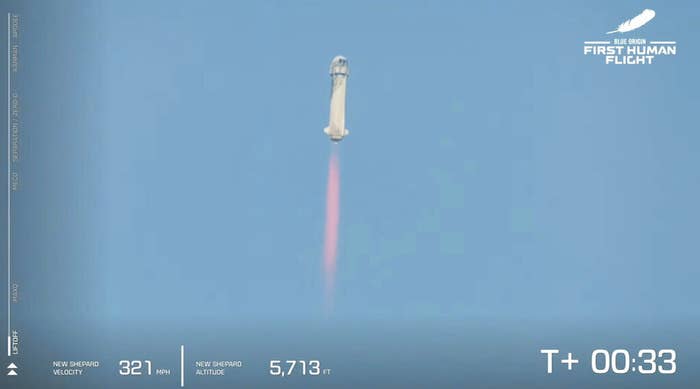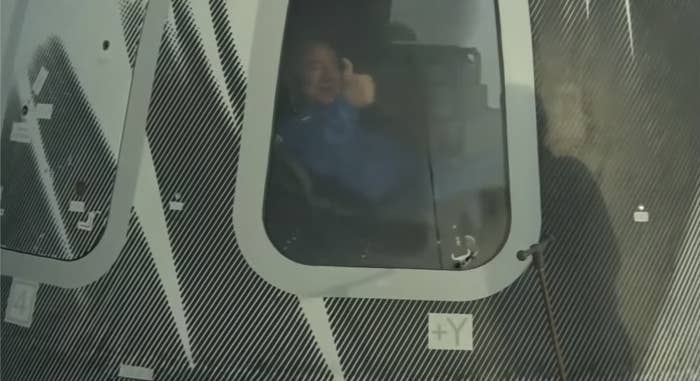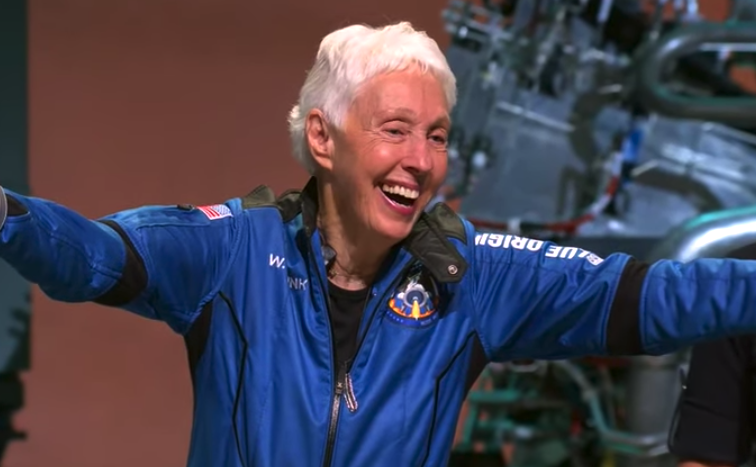
Jeff Bezos went to the edge of space on Tuesday. He's back now.
The multibillionaire Amazon founder blasted off in the very phallic-looking New Shepard spacecraft at 9:12 a.m. ET from Van Horn, Texas, and returned safely to Earth 10 minutes and 19 seconds later (about 19 seconds longer than the paid breaks permitted to many Whole Foods employees).
“Best day ever,” Bezos was heard saying once the capsule landed. The capsule traveled 66.5 miles high, above the Kármán line recognized internationally as the boundary line into space. He later thanked "every Amazon employee and every Amazon customer because [they] paid for all of this" at a post-flight news conference.

It's the first passenger flight for Bezo's aerospace company, Blue Origin. He was joined on the rocket by his brother, Mark Bezos, as well as an 82-year-old aviation pilot. A Dutch 18-year-old whose hedge fund dad bid millions for the seat also joined the trip, after the original auction winner who bid $28 million skipped out due to an unspecified "scheduling conflict." In a nod to history, also aboard the flight was Wally Funk, 82, a veteran of the early Women in Space Program canceled in 1961. Funk had continued training to be an astronaut for decades after the program was shut down, intent on someday going into space, a dream realized with the launch.
"I can't wait to go back," said Funk, at the post-launch event.
Bezos said he would like to return to space as well. "Hell yes, how soon can you refuel that thing?"

The flight came on the 52nd anniversary of the first moon landing. The mission was intended as a proof of concept for the New Shepard rocket, named after astronaut Alan Shepard, the first American to go into space on a suborbital flight in the early 1960s, with Bezos traveling aboard to demonstrate his faith in its safety.
"There's this kind of long history of self-experimentation in science. If you're going to go, then you should go, right? And you don't ask other people to do what you wouldn't do yourself," said Smithsonian Institution space historian Margaret Weitekamp. "And in some ways, this is a vehicle that he built because he personally is excited about the idea of going into space. And so I think he would have had a very hard time giving that seat assignment to anyone other than himself."
Bezos lost a billionaire space race to Virgin Galactic founder Richard Branson, who blasted off in his own spacecraft just over a week earlier, albeit not traveling quite above the Kármán line.
"It certainly does speak to a historical moment when this kind of tremendous wealth has been uniquely available to a very small subset of people," said Weitekamp.
"What we are seeing is a real beginning of adventure tourism in space," said space historian Roger Launius, author of Apollo's Legacy: Perspectives on the Moon Landing. "I'd compare it to climbing Mount Everest. There are real risks here, but it is something that wealthy people, or people willing to spend everything to do it, might undertake."
Bezos said that Blues Origins has logged more than $100 million in sales, with demand high. Each launch costs around $125 million, he said, and the firm would like to lower that cost to $100 million. "We're going to build a road to space, so our kids and their kids can solve the problems on Earth."
In a response to what he described as the animosity of the current era, and perhaps criticism of his flight, Bezos ended the news conference by announcing a $100 million "Courage and Civility" award, celebrating leaders who try to engage the public in solutions without rancor, to donate to the charity of their choice.
The first awards went to criminal justice system reformer Van Jones, and humanitarian chef José Andrés, founder of World Central Kitchen.

